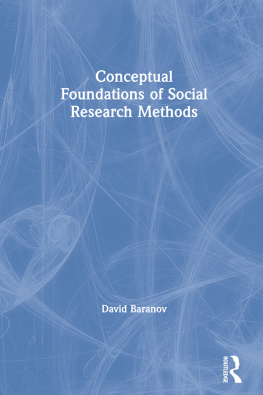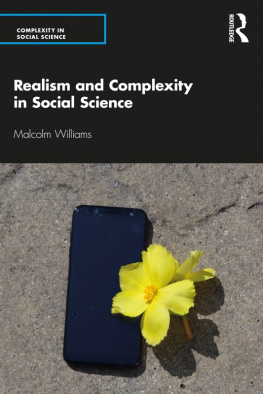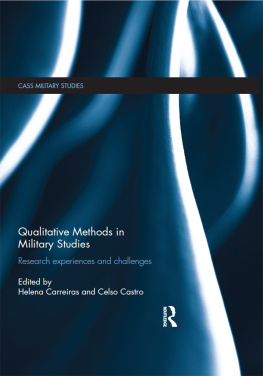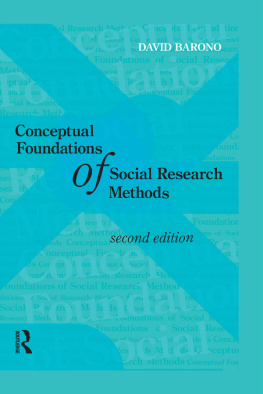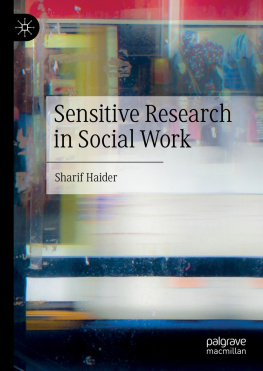C ONCEPTUAL F OUNDATIONS OF S OCIAL R ESEARCH M ETHODS
First Published 2004 by Paradigm Publishers
Published 2016 by Routledge
2 Park Square, Milton Park, Abingdon, Oxon OX14 4RN
605 Third Avenue, New York, NY 10017
Routledge is an imprint of the Taylor & Francis Group, an informa business
Copyright 2004 by Taylor & Francis.
All rights reserved. No part of this book may be reprinted or reproduced or utilised in any form or by any electronic, mechanical, or other means, now known or hereafter invented, including photocopying and recording, or in any information storage or retrieval system, without permission in writing from the publishers.
Notice:
Product or corporate names may be trademarks or registered trademarks, and are used only for identification and explanation without intent to infringe.
Library of Congress Cataloging-in-Publication Data
Baronov, David.
Conceptual foundations of social research methods / David Baronov.
p. cm.
Includes index.
ISBN 1-59451-070-9 (cloth : alk. paper) ISBN 1-59451-071-7 (pbk : alk. paper)
1. Social sciencesResearchMethodology. 2. Social sciencesResearchPhilosophy. I. Title.
H62.B337 2004
300.72dc22
2004006927
Designed and Typeset by Straight Creek Bookmakers.
ISBN-13: 9781594510700 (hbk)
ISBN-13: 9781594510717 (pbk)
Contents
Chapter 1 Embryonic Positivism
Chapter 2 Logical Positivism
Chapter 3 Postpositivism
Chapter 4 Structuralism
Chapter 5 Hermeneutics
Chapter 6 Antifoundationalism
Chapter 7 Yes, But Now What?
- Chapter 1 Embryonic Positivism
- Chapter 2 Logical Positivism
- Chapter 3 Postpositivism
- Chapter 4 Structuralism
- Chapter 5 Hermeneutics
- Chapter 6 Antifoundationalism
- Chapter 7 Yes, But Now What?
Guide
I owe a great debt to many students, friends, and colleagues whose insights and inspiration have shaped my understanding of the core issues explored in this book. Terence Hopkins, Dale Tomich, and Kelvin Santiago Valles were among those who first encouraged me to pursue the disturbing entanglements beneath the surface of methodological issues in the social sciences. Their advice, suggestions, and criticisms continue to prod my interest in the field. Good fortune has allowed me to further consider the implications of these issues through conversations and exchanges with a number of talented colleagues, including Erik Prez Velasco, Gladys Jimnez Muoz, Ruth L. Harris, Robert Brimlow, Jos Toro Alfonso, Khaldoun Samman, and Mark Gaskill.
I am especially grateful for the contributions of Timothy Madigan and Daniel R. Shaffer, whose reviews and comments on earlier drafts of the manuscript were critical for the development of this work. I have also greatly benefited from the skillful assistance of my publisher, Dean Birkenkamp. His encouragement was essential for seeing this project through to its completion and guiding me along the path.
In 2002, I was the recipient of a St. John Fisher College Faculty Development Grant. This award provided me with critical resources and financial assistance for the completion of this project.
Lastly, I wish to acknowledge the essential contribution of Mrs. Druian, without whom this book would never have been possible.
By now the routine is a familiar one. Each fall, anxious throngs of high school graduatesand a growing number of adult returning studentsmake their way onto college campuses. The new arrivals face the formidable tasks of working toward graduation and preparing for a career. This requires, early on, selecting a major. The major will clarify graduation requirements and provide a sense of career options. Ominously, the selection of a major will also lock unsuspecting students into a mind-set and a framework of analysis that will tell them, quite literally, what and how to think, the nature of truth, and which questions are permitted and which are not.
Traditionally, college subjects are grouped into three brancheshumanities, physical sciences, and social sciences. Each encompasses a distinct subject matter and each explores this subject matter through a unique battery of methods. The humanities study forms of creative human expression (art, literature, music, etc.) and deploy various interpretive methods. The physical sciences study the natural world and rely upon the so-called scientific method. The social sciences study the social world (forms of human interaction and individual behavior) and turn to variations of the scientific method. Curiously, in the course of ones undergraduate education, while there is a good deal of recognition and discussion about the distinct subject matters that separate the three branches, little is said of the differences between the branches methods.
The consequences of this oversight can be insidious. Consider the experiences of Fawziyya, Lisa, and Manuelthree seventeen-year-olds who were among those arriving on campus last fall. As it happened, all had suffered the painful loss of their mother to cancer in the past year. All three were, of course, deeply affected by their mothers deaths and these personal tragedies dramatically shaped how they chose a college major. Fawziyya wanted to understand the nature of her mothers illness so she could help others. She chose to study biology. Lisa was curious why, despite the dangers, certain cancer-related practices (such as smoking) are so prevalent across society. She chose to study sociology. Manuel wanted to better appreciate the spiritual and emotional transformation that his mother experienced while dying of cancer. He chose to study literature. Each struggled to come to terms with a deeply personal loss and each chose a separate path. In the end, a common tragedya mothers death from cancerresulted in three distinct forms of knowledge and insight.
Directly tied to these distinct forms of knowledge and insight are methods of analysis that determine how one sees and understands the world. These are the implicit anchors (and the ideology) defining the boundaries of any field. For this reason, they are crucial and, for this reason, they are dangerous. In light of this, a rather absurd situation prevails today. In the course of an undergraduate education, each student confronts a set of fundamental assumptions and presuppositions concerning the nature of truth attached to his or her field of study. However, with rare exception, there is little sustained discussion of these assumptions and presuppositions in comparison with other fields. As a result, students pursue truth within the confines of their field and become the unwitting transmitters of its silent ideology. The purpose of this book is to explicitly address the unexplored assumptions and hidden ideologies that lurk beneath a college education. While there is a particular focus on the social sciences (in particular sociology), there is also much to be gained by those in the humanities and the physical sciences who wish to better understand the role of unspoken premises within their own fields.
SOME BASIC ISSUES
The search for truth shapes all fields of inquiry. Within the social sciences, the notion of truth and the methods used to uncover it have for centuries undergoneand continue to undergoconstant reflection and revision. How best to investigate the social world remains an open question. However, the debates concerning scientific inquiry in the social sciences have evolved along a discernible path with certain recurring issues and themes. The purpose in considering these debates is not to discover the one unassailable method but to better appreciate the plurality of competing methodological traditions that inform contemporary scientific inquiry in the social sciences. Four recurrent issues in particular tend to frame issues and shape this debate. These include the legacy of positivism, the link between the social sciences and the physical sciences, the nature of facts versus values, and the roles of rationalism and empiricism.

